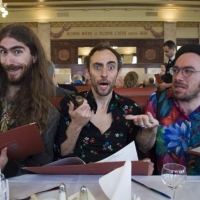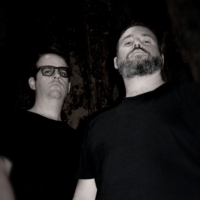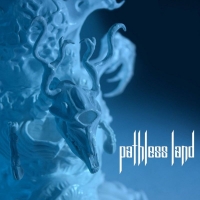Steve Moore and Jon Ireson of long-standing experimental rock/industrial band Post Death Soundtrack released their latest heavy, atmospheric, and thought-provoking album, It Will Come Out Of Nowhere, this past February. A deep-dive into the psyche and a reflection of our divisive and disturbing times, the LP materializes from the ether with raw and riveting instrumentation and emotion.
Moore and Ireson kindly directed some of their time and thought to our ongoing Protest Interview series that highlights the current mindset of musicians who are using their music as a voice of reason and questioning in the madness of this modern age.
Hello! Please introduce yourself/yourselves and give a description of your sound/musical vision.
Jon: We are Post Death Soundtrack, a psychedelic industrial act currently operating as a duo based in Vancouver and Calgary. Our music has been varying degrees of political over the years. Our debut record in 2008 touched on many directly political topics from hegemony and war to religion, with a more ravaged and cynical, yet still hopeful sense of John Lennon's “Imagine” at its core.
In recent years, the focus has gone from outward to inward. Exploring the nuances of your personal perspective and the many variables that can alter your point of view, along with what values stand the tests of time and circumstance.
In terms of sound, the visceral nature of industrial and trip-hop has served us well over the years but for the last couple records we've incorporated more psychedelic elements as well as grunge, doom, hip-hop, house, and Indian melodies.
Steve: We write outsider music.
What is/are the main personal, national, and/or international issue(s) concerning you the most these days? There's so much to choose from, unfortunately! Political corruption, human rights violations, environmental pollution, gun violence, bullying, mental health stigma, internet hacking, rise of extremists, just to name just a few...
Jon: These are all pressing issues and to a large degree are interconnected. Gun violence, environmental damage, and human rights violations are all tied into political corruption. If corporate lobbyists didn't have such ubiquitous influence over the political process, we would be exponentially better equipped to tackle these issues. However, despite these powers-that-be seeming like monolithic, inhuman entities, the resistance to humanitarian ideas comes from real people as well. As an artist, my fascination is really with the source of this behavior.
Why do we not want peace? What is it that drives us to rage against others, to deprive them of their right to happiness, to feed to the point of gluttony? Where does that greed come from and how do we either fight it or learn to live with it? These questions serve to deal with the root cause rather than the symptom.
Steve: At the core I'm concerned about the capacity for divisive thought in the human brain, which leads to racism, violence, all kinds of extremism, and corruption. Personally, I'm concerned about my own mental health, learning from and getting past my own traumas, my own sense of overwhelm.
What song, video, or lyrics quote of yours best represents your current viewpoint on this/these important topic(s)?
Jon: [“Axe Of Fiction”], the first track on the first album that Steve and founding member Ken Buck wrote still best encapsulates our outlook concerning this societal animus, particularly the last verse.
“Forcing myths on babies, faithful violent paintings
Focus is misguided, jackals become lions. Insane.
Run this riddle through me, documentary movie.
I questioned the law, I spoke of what I saw. Pain.
Killing needs an excuse, excuses are easy.
A fictitious being says, “Do this and you'll please me”
Come jump in the water, train your mind for the slaughter.
Be here for protection, rid us of infectious disease.
Can you imagine trespassers and natives together united?
An abolition of the supposed sacred.
Can you imagine our collective myths recognized as the fiction they are and buried underground? Buried underground. Buried underground.”
https://open.spotify.com/track/1wCcX9Nb4KCxqZlb4pBaEr?si=uJngNYw5SSiw0sUAHcbTMw
Steve: "Chosen Sons" was written with extremist groups like ISIS in mind. The lyrics are quite sarcastic so the song is easily misunderstood if taken out of context.
Other songs, most of the songs on this album, ("Piercing the Veil" and "Bridge Burner" are good examples), deal with personal politics, personal issues like depressive disorder, suicidal ideation, trauma, mourning, loss, detachment, anger.
What's your favorite song, video, or lyrics quote by another act or artist that best exemplifies, or at least partly relates to, your current viewpoint?
Jon: The latest Tool record has some great political points to make. Although Maynard doesn’t call out specific causes, he does address the roots of corruption and apathy on “7empest” and “Descending”, respectively. “7empest” warns of the perils of narcissism and combative ethos and “Descending” doesn’t specifically call out climate change, but couldn’t be a more eloquent indictment of the deniers and anti-green lobbyists.
“Free fall through our midnight, this epilogue of our own fable.
Heedless in our slumber.
Floating nescient we free fall through this boundlessness,
This madness of our own making.
Falling isn’t flying. Floating isn’t infinite…
Come, Our end, suddenly. All hail our lethargy. Concede Suddenly.
To the quickened dissolution.
Pray we mitigate the ruin, calling all to arms and order.
Drifting through this boundlessness, this madness of our own making.
Sound our dire reveille. Rouse all from our apathy, lest we cease to be.”
I think we’ve both always drawn a lot from strong political voices from Neil Young and John Lennon to Rage Against the Machine.
Steve: I feel like Tool's new Fear Inoculum album touches on some of the concerns of shared mania. A highlight for me was "7empest", which speaks to extremism in a similar way that "Chosen Sons" does.
https://genius.com/Tool-7empest-lyrics
In regards to depression/mental illness, Radiohead's "Idioteque" does an excellent job of capturing.
What other forms of protest, besides through your music, are you involved with to get your message across?
Jon: Nothing at the moment, though I’d like to be more involved. There are always going to be issues that need to be fought for, but I think we’re lucky here in Canada that we aren’t directly faced with some of the injustices plaguing the United States (women’s abortion rights, the extortion of the medical industrial complex, costly and inhuman wars).
Here though, income inequality, climate change, and indigenous rights are still major concerns that need to be addressed. On a local level here in Vancouver, supporting those opposing the Trans Mountain pipeline, such as the Wilderness Committee or Islands Trust Council, is a great way to support indigenous land rights as well as make an incremental difference on climate change. Not only is this a life and death issue, but as someone who takes great inspiration from the natural world, we need to be doing everything we can to protect it.
Steve: None at the moment. Art is the only medium I work with and other than that people rarely hear from me at all.
It's easy to judge and criticize others, especially in these unsettling times of overt intolerance, ignorance, and insults, but the fact remains that we need to work together "for the good of the people", as a family friend so succinctly put it. Objecting to and protesting against, but then working on a solution to the problem is critical in ensuring that positive change occurs. Name an action to take, or a campaign/charity that would be worthwhile to contribute to, for your cause.
Jon: In political terms, vote for the candidate who is the least beholden to corporate interests and is the most committed to real action on the ground, rather than esoteric rhetoric and political jockeying. Sure, ousting Trump is the priority, but if you can do that with Bernie or Pete instead of Joe, you actually have a chance at making some real change. Mayors govern almost apolitically and that spirit is the most productive even if it’s hard to maintain on a national scale with 330 million people.
Also, this seems to be the “butt hurt” generation. The right always condemns the left for being overly sensitive, which they can be, but the right is just as thin-skinned, just over different issues. All this superficial, reactionary bickering is having a deep-seated effect on the soul of our society. Marianne Williamson isn't wrong when she talks about this crisis of consciousness. Doesn't mean she'd be a good president, but it's great that she's making that point on the national stage.
As for my backyard, voting for the Conservative Party in our election in October will be a bend towards Trumpian politics, so I would encourage anyone to oppose that with their vote.
Steve: I really like Hope For the Day, an organization based on raising mental health awareness and suicide prevention education, and it’s especially focused on the creative industry. You can find help for yourself or a loved one, or donate through their website.
What gives you hope for the future?
Jon: 1968 was a hard year. Riots, assassinations, and a cresting of political anger, but that now stands as a watershed year in the 20thcentury. Strife is often an indicator of progressive change. The more we push forward, the more those set on holding their grip on power will resist, but we have to find strength and determination in the fact that we are still headed in the right direction.
Steve: I tend to focus on the micro. We're working on new music. I wonder what it's going to be like. In that is the politic though. We all learn through what we do and what we create. When we take on a project it's like writing a book, a full story. So I'm excited as to what new perspectives, new energies, and truths will unfold and how that relates to the whole.
Where can we purchase/stream your music and find out more about you?
Jon: Our albums are available on all major streaming platforms and you can purchase our latest album It Will Come Out of Nowhere digitally and on vinyl at Bandcamp: https://postdeathsoundtrack.bandcamp.com/
Steve: We're active on social media and our music is distributed so can be found at your preferred outlet.
https://www.facebook.com/postdeathsoundtrack/




